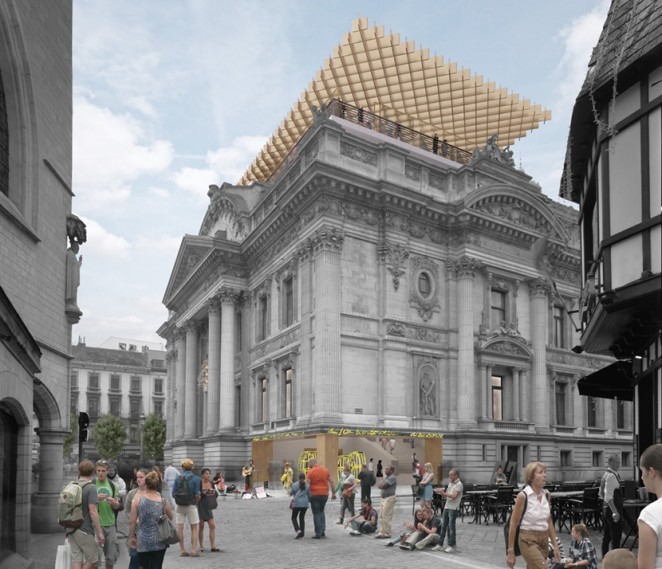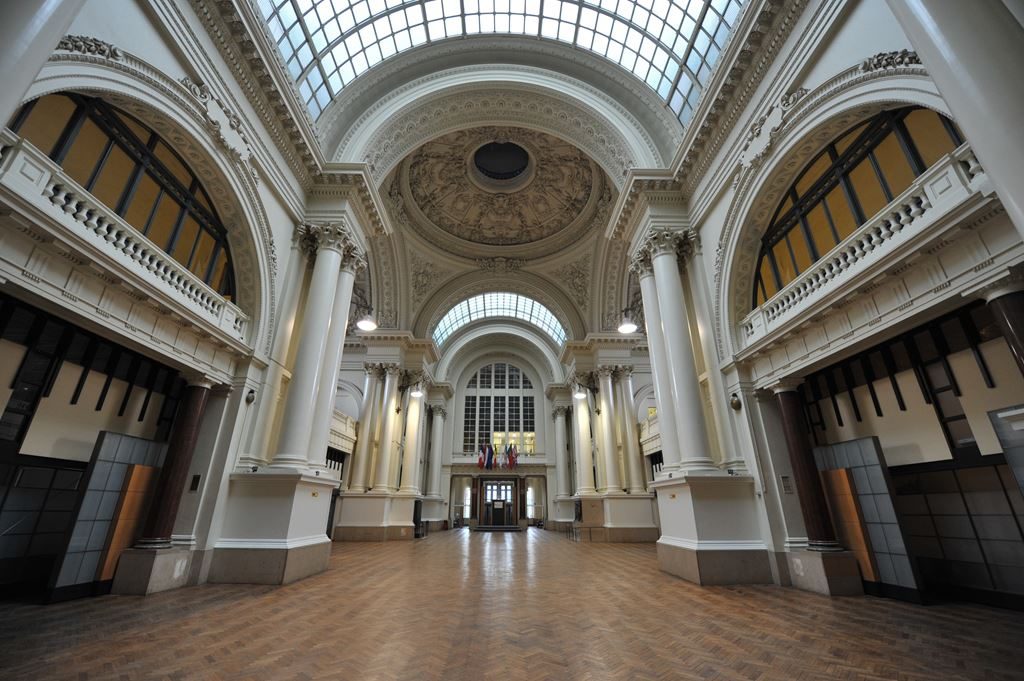It's known as the home of beers so what better place than Belgium for a shrine to its brewing legacy? That was the thinking behind plans for the ‘Temple to Belgian Beer’ project.
After a 15-month study the Brussels authorities authorised plans to create a "temple" dedicated solely to Belgian beer.
It will be housed, appropriately, in one of the city's grandest (if currently rundown and totally empty) buildings: the Bourse, Belgium’s former stock exchange.
The Bourse is a wonderfully decorative and listed building which, like the country's brewing traditions, is something that many feel should be cherished.
Even so, the proposal has not been totally without controversy.
Initially, it was thought the "temple", which will comprise a museum and tasting rooms, would feature only bigger breweries.
But Brussels alderman for tourism Philippe Close said that as diversity is one of the "biggest strengths" of Belgian beer, there must be a place for small craft breweries.
Six architects from a field of 35 applicants were chosen to design it and the plan is that it will open by 2019, slightly later than originally planned, and attract over 400,000 visitors a year, said Fabrizio Bucella, who is official spokesman for the beer temple project.
He told The Brussels Times that the idea was for the beer temple to become the No. 1 tourist attraction in Belgium, adding, "As the person responsible for tourism, it is important for Philippe Close that the country's top tourist attraction is in Brussels itself".
Bucella said the beer temple will comprise an interactive museum, roof terrace, bar and restaurant. There will also be opportunities for visitors to do beer tastings.

"It won't be a museum in the traditional sense but non stuffy and a hands-on experience that even people with no great interest in beers can enjoy", he said.
"The focus of course will be on beers but there'll be lots of other family-friendly features".
He stressed that this "beer mecca" will not merely be for the preserve of big brewers such as AB InBev, saying, "It is intended to be a showcase for the best of Belgian beers so all brewers, from the largest to the smallest, will be included. That is the idea".
The Belgian Beer Project (BBP), its formal title, is a public-private partnership, which is itself something of a novelty in Belgium where there are few PPPs.
It involves public and private sector partners. The private side comprises 30 Belgian brewers ranging from AB InBev and Maes to small entities and all others in between.
Krishan Maudgal is spokesman for the brewers involved and says, "The BBP will provide an ultimate entertaining experience centre that puts forward Belgian beer in a modern, interactive and dynamic environment. It should enable visitors to discover, explore, share and expand the richness, diversity and traditions of the Belgian beer culture".
He adds, "We aim to develop the BBP as a landmark for Belgian beer and its culture in the world and create a must see visitor centre/attraction in Brussels, one that positions itself in Belgium as one of the top attractions/places to visit”.
"The BBP will not have the largest Belgian beer bar in the world and will not be linked to the number of beers in–or the size of–the bar. Rather, the bar will reflect the diversity for which the Belgian beer culture is known all over the world. The ambition of the stakeholders is to develop a personalized visitor experience".
A multi-disciplinary design team was appointed last June and consists of Gent-based Robbrecht & Daem and Baneton-Garido as the architects, Base Design in charge of communications and UK-based Mather & Co as the designers. A master plan will be presented to stakeholders in the near future and the procedure for permits and approvals will be launched soon after.
Some of the smaller Belgian brewers involved might include a long-standing Belgian brewer Martyn's, launched over 100 years ago by the famous British master brewer John Martin.
For over a century and thanks to a unique blend of English tradition and Belgian savoir-fair, Martyn's has been producing excellent beers, including one to mark the bicentenary of the Battle of Waterloo last year.
The whole beer project is estimated to cost some €25m, with this evenly split (that is, €5m each) from the City of Brussels, Brussels Capital Region, the Belgian federal government, the EU and the beer industry itself.
Reconstruction of the Bourse will cost €10.5m with the museum costing another €10m. About €3m will be spent on re-designing the building.
Bucella said the work is due to finish by the end of next year with a grand opening scheduled for summer 2019.
The country's brewing industry has come in for criticism of late with concerns about the dominance of the giants, making it difficult for smaller family based breweries to gain market share. Even so, the idea behind the beer project has generally been well received.
Alan Hope, a Brussels-based beer writer for the Belgian Beer & Food magazine says, "I welcome this as an addition to the tourist attractions of Brussels and one which places Belgium's great beers at the centre of everyone's attention".
However, Hope, who has written extensively about Belgian beers, added, "One concern would be for brewers large and small to be given an equally important opportunity to show what they have, and not to have the presence of brewers determined by who has the economic weight.”
"The city of Brussels is contributing a sizeable sum of money to this so it's no longer purely a private matter between private companies. The public interest would seem to demand a fair shake for big and small".
He adds, "It's also important for the three breweries who actually produce their beer in Brussels–Cantillon, Brasserie de la Senne and En Stoemelings–to be represented in a museum so prominent in Brussels".
Many keenly await its completion but, while the temple is not due to open for three years yet, it has once again shone the spotlight on what is a rich and varied subject: Belgium's brewing traditions.
Tim Webb, who has authored several critically acclaimed Belgian beer guides, says, "Belgium is chauvinistic about beer. If there is such a thing as a typical Belgian then their take on beer would involve immense pride and pitifully little knowledge".
That could be where the "beer temple" might help, as one of the objectives is to better educate the Belgian public about the produce (beer) that has served the economy so well for so long.
Given that the city's newest tourist attraction will be devoted to beer, it's perhaps easy to overlook the fact that despite having the greatest diversity of beers in the world, the Belgian brewing industry had been in decline for years.
The reasons for this decline–increased industrialisation, small family businesses taken over by conglomerates–were the same as the rest of agribusinesses.
At the start of the 1980s, though, this decline seemed to have been halted and there was fresh interest in "traditional country products".
New breweries were launched and international recognition saved many small breweries.
Belgian beer historian Xavier Eugene says, "Since then, however, certain brewers carried by this wave have gone for the money, modifying their beers to 'make them easier to drink' while continuing to portray them as being the originals”.
"Yet hope remains. Belgium still shelters some irrepressible brewers determined to continue to make authentic products."
The Belgian brewing sector has undergone large changes in the course of the past 100 years. Some 3,223 brewers were active in Belgium in the year 1900. More than a century later there are barely 200.
Even so, the beer industry, Europe-wide, is making an increasing contribution to the EU economy: total consumer spending on beer in the EU in 2014 was more than €110bn, the equivalent of €20 per head of population. Total beer production in the EU was around 400m hectolitres in 2014 and the industry employs nearly 130,000 people directly in companies producing beer.
In Belgium, there are 168 breweries and the sector supports 49,251 jobs, 73 per cent of them in the hospitality sector. The industry generates €1.769bn for the country's economy (mostly in the hospitality and retail sectors) and beer raises some €1.46bn in tax revenues.
Beer is not only one of Belgium's oldest industries–it is also at the forefront of innovation. Brewers are investing heavily in new products, often specialty beers appealing to changing consumer tastes. The growing variety of beer styles includes an increasing number of lower- and non-alcohol versions.
With over 900 new breweries opening since 2013, the European beer industry has bounced back from the financial crisis and every 1 job in a brewery generates a further 17 jobs on average–around 1% of total EU employment.
If beer were a country, its total GDP would compare to that of Croatia or Luxembourg (€51 billion value added); it has similar employment to Slovakia (2,3 million workers), and generates total tax revenue similar to that of Hungary (€42 billion government revenue).
Pierre-Olivier Bergeron, Secretary General of The Brewers of Europe, said, "Beer is a European success story and the brewing sector is one of which Europeans, its citizens and its policy-makers, should be immensely proud”.
The interest in quality Belgian beers across Europe and the rest of the world is reflected in the many beer-related tourist attractions that have sprung up across the country–with the beer temple being the latest.
Whatever the future holds for the industry here, it is hoped that this shrine to the amber nectar will be a fitting homage to a proud Belgian success story.
Final word goes to Philippe Close, the man who has spearheaded the project, who told The Brussels Times, "`The 'Brussels Beer Experience' is designed to be the first thing for visitors to see when they come to Brussels".
He said, "Belgium is a modest country but the influence of Belgian beers is obvious", before adding, "We have to show off our knowledge and savoir-faire".
By Martin Banks

